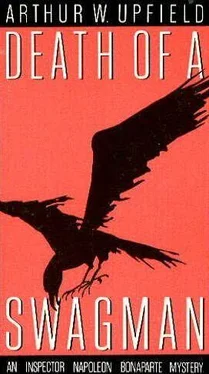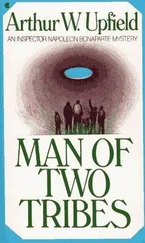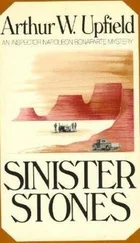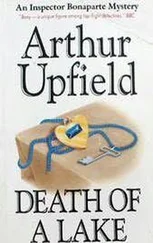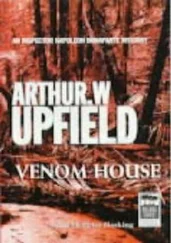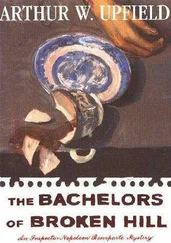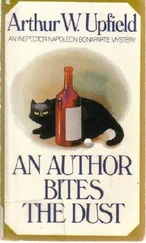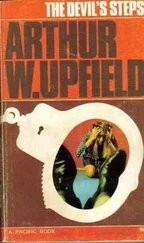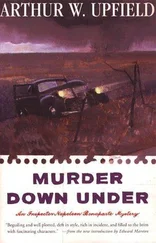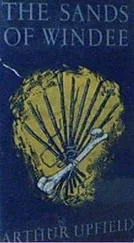Arthur Upfield - Death of a Swagman
Здесь есть возможность читать онлайн «Arthur Upfield - Death of a Swagman» весь текст электронной книги совершенно бесплатно (целиком полную версию без сокращений). В некоторых случаях можно слушать аудио, скачать через торрент в формате fb2 и присутствует краткое содержание. Жанр: Классический детектив, на английском языке. Описание произведения, (предисловие) а так же отзывы посетителей доступны на портале библиотеки ЛибКат.
- Название:Death of a Swagman
- Автор:
- Жанр:
- Год:неизвестен
- ISBN:нет данных
- Рейтинг книги:4 / 5. Голосов: 1
-
Избранное:Добавить в избранное
- Отзывы:
-
Ваша оценка:
- 80
- 1
- 2
- 3
- 4
- 5
Death of a Swagman: краткое содержание, описание и аннотация
Предлагаем к чтению аннотацию, описание, краткое содержание или предисловие (зависит от того, что написал сам автор книги «Death of a Swagman»). Если вы не нашли необходимую информацию о книге — напишите в комментариях, мы постараемся отыскать её.
Death of a Swagman — читать онлайн бесплатно полную книгу (весь текст) целиком
Ниже представлен текст книги, разбитый по страницам. Система сохранения места последней прочитанной страницы, позволяет с удобством читать онлайн бесплатно книгу «Death of a Swagman», без необходимости каждый раз заново искать на чём Вы остановились. Поставьте закладку, и сможете в любой момент перейти на страницу, на которой закончили чтение.
Интервал:
Закладка:
“Come on, shake hands,” invited Bony, and the animal dutifully lifted his right forepaw, his tail now a flail, the entire body of him expressing friendship.
One nail was absent from the paw clasped by Bony’s hand.
Someone whistled shrilly, and at once the dog raced away to vanish into the garage doorway. Bony rose to his feet and fell to work on his painting. Five minutes later he observed Mr Jason coming from the garage.
“Good morning, Burns. How’s the work going?”
“Goodo, Mr Jason. Rotten colour, though.”
“I agree. It will be an eyesore in Merino,” predicted Mr Jason. “As the Bard of Avon said, so perhaps shall I: ‘O, I havepass’d a miserable night, So full of ugly sights, of ghastly dreams.’ I intend to write a strong protest about that paint to the police department.”
Mr Jason was wearing blue engineer’s overalls, which seemed out of place when quoting Shakespeare. The expression in his dark eyes now was mild, almost paternal, when he went on:
“One does one’s best to bring beauty into the outback, but so few appreciate one’s efforts to beautify a place or beautify the mind with passages from the works of the world’s literary giants. Take to reading, Burns. Read the works of Shakespeare and Milton and Wordsworth. Elevate your mind, Burns. Did you notice any peculiar circumstance relative to old Bennett’s demise?”
“Er… no,” replied Bony, a little set back by such a question following so closely upon the subject of literature and the elevation of the mind.
“I saw you walking about the old man’s hut the other afternoon,” admitted Mr Jason. “You are probably aware, having heard what I said yesterday, that I am not easy in my mind about that death. You did not, by any chance, observe any unusual tracks? I think, you know, that someone frightened old Bennett to death.”
“But why frighten the old man?” argued Bony. “He had no enemies, had he?”
“I don’t know. I am only going on what I observed on the man’s face. You were, of course, asked to accompany the party by the sergeant?”
“Yes, he did ask me to go with him. I looked about all round the hut but I could see nothing strange, or of any value. I am not very good at tracking. Not so good as the full blacks.”
“Ah, no, I suppose not.”
Mr Jason departed down the street and returned on the far side. Twice he stopped and chatted with people. Several times he was spoken to beyond the normal greeting. What had Rose Marie said that her father had said of him? A broken-down actor. Well, he might have been an actor, but hardly a broken-down one, whatever that term might mean. There was a drover inwestern Australia who, during two months’ association with Bony, had recited word-perfect every Shakespearean play.
People were shopping in the few stores and gossiping in the shade of the pepper-trees. Cars and trucks were arriving from west and east, to stop at the hotel as though their engines would fall out should they be driven past it. The mail car from Mildura arrived at eleven, from the west. It was the only vehicle to pass the hotel. It continued on to the post office, then it was turned and driven back to the hotel to unload its passengers. At the garage young Jason was kept busy pumping petrol and serving oil and examining engine defects.
At noon the humming of the blowflies was subdued by the burst of children’s voices released from school. Rose Mariecame flying up the street, to give Bony a wave and a smile before darting through the police station gate and into the house.
Everyone who passed along Bony’s side of the street said “Gooddayee ” to him. Thewords of the greeting never varied, nor was it ever omitted. Several passers-by paused to speak to the painter and to sympathize with him in his bad luck at having been chosen by the sergeant to paint that fence.
In the afternoon there came the Rev. Llewellyn James. His greeting was minus the final longe.
“Gooddayee,” responded Bony, straightening his back and turning about to see the youngish man who gazed at him intently with pale blue eyes. He wore no hat, and his fine brown hair was unruly. His hands were large and white and soft, and from the crook of an arm dangled a walking stick. Grey flannel trousers and black lustre coat failed to hide his flabbiness. He spoke with the unmistakable accent of the Welshman.
“I regret being informed of your fall and subsequent arraignment before the court,” he said. “However, I am glad to find you at honest labour in the pure sunshine, for which you must thank Sergeant Marshall. What is your name?”
“First I’d like to know who you are,” Bony said with pretended sullenness.
“I am Mr James, the clergyman.”
There was now superciliousness in the voice, and an expression of hardness had flashed into the pale blue eyes. Bony thought that he knew his man and assumed humility.
“Sorry, Padre,” he began. “My name’s Robert Burns. I’m a stranger to this part of the state.”
Mr James smiled, and Bony could actually see the shaft of wit being fashioned in the man’s mouth.
“No descendant of the great Scotch poet, I presume. I cannot trace the Highland burr in your voice.”
It was a different Bony from the one who had spoken that morning to Rose Marie.
“I am Australian-born,” he said. “My father may have been a poet. I don’t know. I was reared in a North Queensland mission station, and I roam about Australia whenever I want.”
Mr James was made glad that he knew his parents. It was a feeling he found comforting and pleasant. He began to press questions as though fully entitled. What was Bony’s age; what had been his education; what were his domestic responsibilities; and what was the reason of his being here in the south-western quarter of New South Wales? He did not inquire concerning Bony’s religion. Presently he said unctuously:
“Well, Burns, remember that you would not have found yourself in your present predicament had you not succumbed to the temptation of taking alcoholic refreshment. It is the greatest pitfall to entrap the unwary. At the expiration of the term of your imprisonment, have you any employment to go to?”
Sadly Bony shook his head.
“Then I will speak to Mr Leylan about you. He is the owner of Wattle Creek Station and is a great friend of mine. Can you ride a horse?”
“So long as it’s a quiet one, Padre.”
“Good! Well, we’ll see about it. Meanwhile, ponder on your delinquency so that profit may emerge to you. Did I see you accompanying Sergeant Marshall and Gleeson and Dr Scott to the late Mr Bennett’s hut the day before yesterday?”
“Yes, Padre, that’s so.”
“What were you doing walking round and round the hut when the others were inside?”
“Just having a look around, Padre.”
“Oh!”
Mr James appeared to be happier about Robert Burns. The word “Padre” sounded well. He had been resolute in his attitude against serving with the armed forces, but he understood that the title was used by both the officers and the men.
“Looking around!” he echoed.“For what?”
“Nothing in particular, Padre,” Bony replied, gazing over the minister’s shoulder. “You see, the sergeant thought that, being half aboriginal, I might find tracks that were peculiar, sort of, the sergeant thinking at that time that the old man might have been killed.”
“Ah… yes… certainly. And you are a tracker?”
“Just ordinary, I suppose. I’m not much good at anything.”
“Perhaps not, Burns, but we must all try to make something of our lives.” Into the minister’s voice had crept a whine. “Keep to the straight and narrow path. I will not forget you. It may be possible to reclaim you, for I observe only a trace of degradation in your face. Good day to you.”
Читать дальшеИнтервал:
Закладка:
Похожие книги на «Death of a Swagman»
Представляем Вашему вниманию похожие книги на «Death of a Swagman» списком для выбора. Мы отобрали схожую по названию и смыслу литературу в надежде предоставить читателям больше вариантов отыскать новые, интересные, ещё непрочитанные произведения.
Обсуждение, отзывы о книге «Death of a Swagman» и просто собственные мнения читателей. Оставьте ваши комментарии, напишите, что Вы думаете о произведении, его смысле или главных героях. Укажите что конкретно понравилось, а что нет, и почему Вы так считаете.
